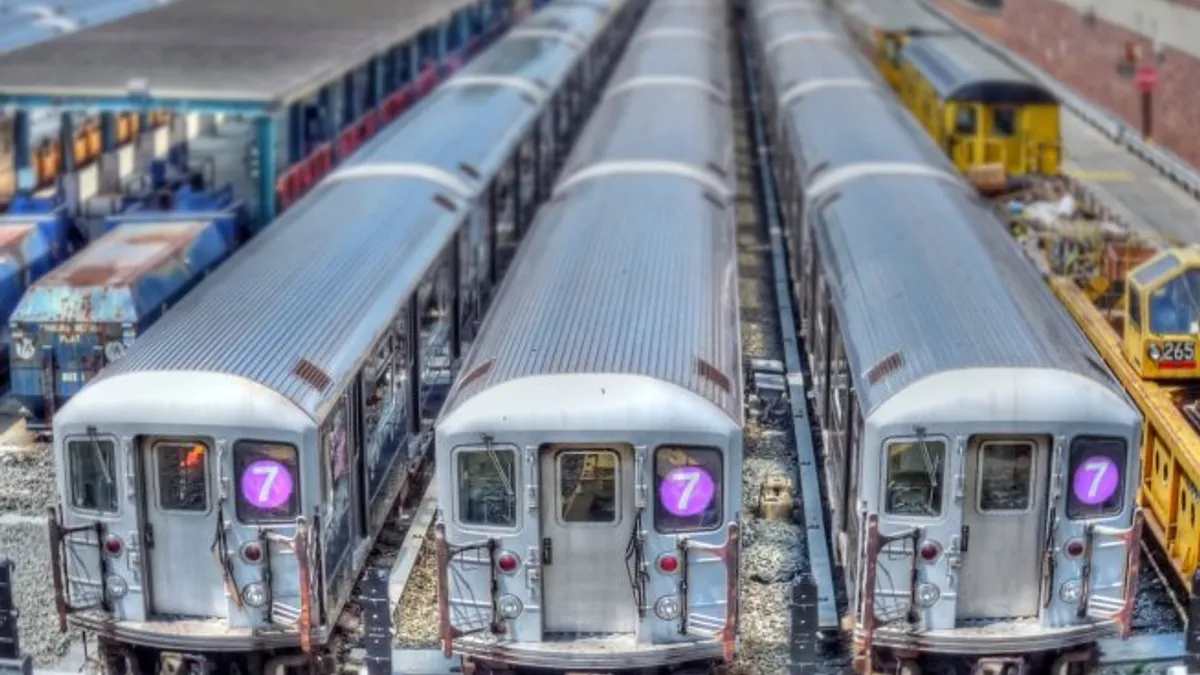Dive Brief:
- New York Gov. Andrew Cuomo and Mayor Bill de Blasio jointly released a plan to improve the Metropolitan Transportation Authority (MTA) and create a dedicated and sustainable funding system for the agency.
- The proposal entails 10 points, the main ones being: an MTA reorganization to consolidate the six regional transit entities into one; adding congestion pricing in Manhattan's Central Business District; limiting fare increases; preventing fare evasion; increasing partnerships with the private sector for projects; expediting the completion of the Subway Action Plan; and undergoing an independent audit by next January.
- "Working New Yorkers are struggling to get around our city — we can't let another year pass without action that makes their lives easier. It’s now clear that there's no way to address it without congestion pricing and other dedicated revenue streams," de Blasio said in a tweet. In another tweet with video clips he said: "We're dealing with a crisis with our subways and buses like we've never seen before. We cannot allow the status quo, particularly with our subways, to continue. It's causing too many problems for hard-working people in this city."
We have to fix the MTA. We have a proposal that addresses the needs of all five boroughs. The time to act is now — we have to be the generation that sets our subways and buses on the right path for the future. pic.twitter.com/vtOY3AK5X9
— Mayor Bill de Blasio (@NYCMayor) February 27, 2019
Dive Insight:
New Yorkers have had a love-hate relationship with MTA for years. Disinvestment in the system and piecemeal repairs led to deteriorating infrastructure while system reliability tanked and failures and delays rose. In fact, delays rose 14% between 2016 and 2017, and at that time certain lines only had an on-time rating of 40% or less.
The situation came to a head in summer 2017 when a subway train derailed and 34 riders were injured. The issue suddenly changed from being a mere inconvenience to leading riders to fear for their safety. The following week, Cuomo declared a state of emergency for MTA and pledged $1 billion for improvements. That funding came on top of the $32.5 billion allotted in the MTA five-year capital plan for 2015-2019.
Since then, lawmakers have kicked efforts to improve the system into high gear. Last spring the MTA president released a plan to repair and modernize the subway system on a sped-up timeline. Yet, challenges persisted and last summer it was revealed that New York spent billions in overstaffing and inflated construction costs on its subway, leaving MTA unable to meet maintenance needs.
Cuomo has long supported congestion pricing as a way to pay for MTA fixes, but de Blasio has just as staunchly opposed the idea. He previously said he hadn't yet seen a model he thought was fair and that it would increase the financial burden of working people traveling into the city center. However, research indicates wealthy commuters tend to drive into the city while low-income residents tend to take public transit, which would benefit from the congestion pricing.
De Blasio now backs the congestion pricing model laid out in the jointly released plan. It involves installing electronic tolling devices in Manhattan's Central Business District and implementing tolls that vary depending on the time of day. In addition to supplements from the state's cannabis excise tax, the toll funds would go toward MTA improvements, with priority given to the subway system. Toll prices have yet to be determined but the system is to be in place by December 2020.
The other prominent aspect of the MTA plan is the reorganization that would blend the region's six transit entities into one, instead of having rail, commuter rail, buses and other entities all operate separately. Common functions such as construction management, legal, engineering, procurement and advertising will be consolidated to improve efficiency and effectiveness. The restructuring is scheduled to finish by June, but the joint plan says it must be "coupled with a change in culture."












